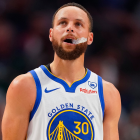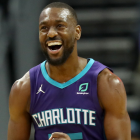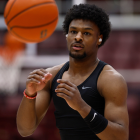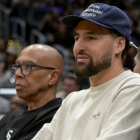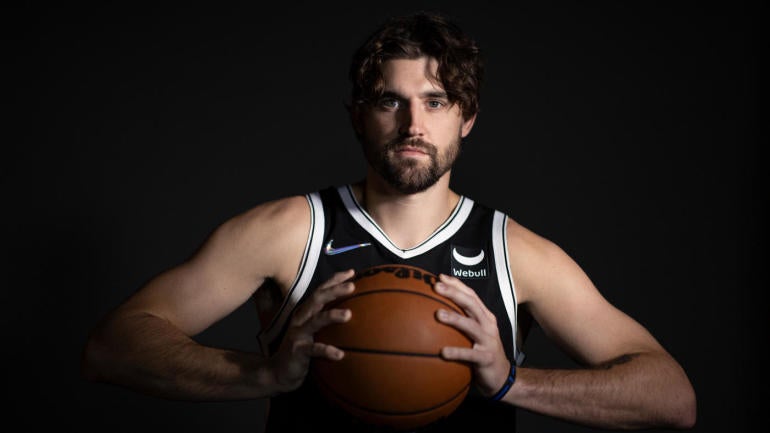
NEW YORK -- Like many young professionals, Joe Harris moved to Brooklyn for a job opportunity. He was 24 years old when the Brooklyn Nets offered him something of an entry-level position. Minimum salary, two-year contract, one year of guaranteed money. Friends from college were working in the city, too, albeit with more conventional hours.
Eighty teammates later, Harris is 30, entering the second year of a four-year contract worth $72 million guaranteed. He is the only player in Brooklyn who has gone from playing off Brook Lopez and Jeremy Lin under Kenny Atkinson to playing off Kevin Durant and James Harden under Steve Nash. He is the only player in Brooklyn who took 62 losses in Year 1 of the rebuild and 54 in Year 2. He is the only person in Brooklyn who was in the players-only meeting that precipitated the dramatic turnaround that led to the playoff berth in Year 3.
He is the Net who remains.
"It's a pretty special thing just to be able to see the whole spectrum of it," Harris says at the Nets' practice facility, three days before the first regular-season game of Year 6. He appreciates having been "part of some foundational pillars and trying to establish good culture here, where it's talked about through the NBA and you get veteran guys that want to come and be a part of it."
Harris doesn't like it here. He loves it, as he says repeatedly. Six years in, he still casually evangelizes about the organization, the city and his spots. "I love just being able to send guys to Roberta's or wherever it might be," he says. When he visits the Bushwick pizzeria, he always gets the "Bee Sting" -- soppressata, chili, honey -- according to his Grub Street Diet, published this preseason.
"I love living in Brooklyn," Harris says. "I think even if I wasn't playing here, I'd still live here. I mean, I love living in New York, and this is definitely my home. I loved the city even before I started playing here, but getting to experience it through these last six years, it's just made me even have a greater appreciation for it, and I really just love, love living here."
Off the top of his head, Harris says, he does not know how close he is to becoming the Nets' all-time leader in 3-pointers made. Informed he is just 12 behind Jason Kidd's franchise record, he says it's one of those things that he doesn't think about often. He can look back on it when his career is over.
Right now, he is "focused on just being present," he says. "Trying to get better each day, trying to build in these championship habits." In one sense, that means deprioritizing individual achievements. In another, more immediate sense, it means concentrating on his hips. But we'll come back to that.
The redemption headline writes itself: EYES ON A TITLE, HARRIS MOTIVATED TO MAKE UP FOR MILWAUKEE SERIES. That angle, however, is at odds with Harris' approach to the game.
"Of course, I wish I would have played better," Harris says. "Shit, like, if I had played perfect, I'd be a f---ing All-Star player, we wouldn't be having a conversation like this. But that's not the reality of the matter. But what is the reality is that you try and get back to right now and focus on this."
This is the daily monotony of coming into the practice facility, hitting the weight room, getting shots up and preparing for an even longer season. Yes, Harris shot 8 for 33 from 3-point range in Games 3 through 7 of the Nets' second-round series, but, as he says, he can't go back and change it. If fans want to hear that he spent his offseason stewing over the loss and castigating himself, sorry.
That "wouldn't be a healthy thing at all," he says. "It probably wouldn't help me going forward, either." It is not as if Harris missed those 3s against the Bucks because he didn't understand they were the most important shots of the season or didn't want to win badly enough.
"F---, we're all some of the most competitive people in the world," he says. "I know the fans certainly care, but, like, shit, I'm the one that's in here every single day of my life busting my ass to try to get to the point where we compete at the highest level and you get in those moments for big shots. I want to make those shots more than anything, you know? That's why I come in here and I put in work every day."
Harris knew he was capable of more, and he says it's "just human nature" to look back your misses and mistakes at the end of a series. He doesn't want to "inflate any one particular person's importance, though," in a team loss. "We all win and lose together," he says.
None of this is to say that Harris felt fine in the immediate aftermath. "I'm not going to lie: I was definitely upset," he says. "Like, it sucks. Your season finishes on a very unexpected note, and, none of us had anything planned. We were anticipating playing a lot longer than we did. It definitely stung for a while."
Harris says that, psychologically, it was like a poor showing for an Olympian: "Everything comes down to one moment." The stakes in Game 7 were "win and everybody's happy and it's great; lose and it feels like it's the end of the world." Brooklyn lost, and if he had made more shots, well, who knows? "Maybe we still would have lost," he says, "but I think it would have given us a better chance to win." He didn't watch the rest of the playoffs, and when he initially got back to work, he did indeed turn his disappointment into motivation.
He needed to move on, though, so he can perform better in the next big moment. "You know when you're playing your best basketball when you are your most present," he says. Harris has a lot of practice with this. Consider that he led the league in 3-point percentage last season and missed 233 3s. If you are "mentally stuck" on a miss, he says, more will come. You can even throw yourself off by dwelling on having made your last shot.
"I know that I'm not going to shoot perfect every game," Harris says. "That's just the reality of it. I hope to, for sure -- I don't want to ever miss a shot. But I know that the chances are, I mean, it's going to happen."
Harris has been saying this kind of thing the entire time he's been here. Given how it jibes with the Nets' organizational ethos, is it a Joe thing or a Nets thing? He says his philosophy hasn't changed since high school. It can be difficult, however, to separate the two.
I show Harris a photo of the old (i.e. young) Nets. It's a group shot taken on the team plane after a miraculous, D'Angelo Russell-led, fourth-quarter comeback in Sacramento. Harris is near the back, with Caris LeVert to his right and Spencer Dinwiddie to his left. Veterans DeMarre Carroll, Jared Dudley and Ed Davis are in front of him.
"That's a great crew right there," he says.
I remind him that this is from 2019 and it is still 2021.
"It's pretty wild," he says. "Especially when you say that. That it was 2019. For us to be in this place now with the team that we have, versus that group. That group feels like it was so long ago."
That group won 42 games and made the playoffs ahead of schedule. Harris says it jelled like a college team. "The camaraderie was really special," he says, a mix of young players "at the same sort of place in our lives where we liked to hang out together off the court and then we played well together" and vets who "were great at taking us all under their wing."
There are things he misses about that time, even if he wouldn't trade his current situation for it. You can only take the NBA by surprise once, and it's fun to carve out your niche next to a bunch of other guys hungry to do the same.
"We were all just really trying to find our way in the league," he says, and Brooklyn gave them the infrastructure they needed to do so. "So I miss that aspect of it, where you're trying to really establish yourself and you have something to prove every time that you go out and play. And that's not to say that that's not necessarily still there, but it's a little different when now we have sort of a target on our back and there's championship expectations."
Even with those expectations, though; even after a coaching change and all this roster turnover; even with superstars and former stars flocking to Brooklyn; Harris says the environment hasn't changed that much. The Nets might no longer call their daily skill work "vitamins" -- a term that came with Atkinson from Atlanta and originated in San Antonio -- but every player still has their individually tailored development plan.
The routine is the same, he says. You come in to the practice facility. You have your table time with a physical therapist. You have your time in the weight room with the strength and conditioning coach. You have your court time with the player development coach.
Sure, development means something different to a 36-year-old LaMarcus Aldridge than it did to a 19-year-old Jarrett Allen. Vets tend to like the way the Nets do things, though, because "everyone is trying to help you out," Harris says. The structure, the emphasis on performance, the emphasis on individual work, the culture of collaboration between departments, "all of that stuff is still in place."
Harris says he doesn't know what it means that he has outlasted all the other players who practiced in this building and talked up the organization before it was a contender. "I think a lot of luck probably plays into it," he says, especially considering how rare it has become for any player to stick anywhere. Reluctant as he is to talk about the 3-point record, he allows that it is a representation of what the Nets have meant to him.
"Obviously it's cool," he says. "I never really thought that I would be in a place where I could say something like that," he says. "But it doesn't happen unless a lot of stuff comes together, you know? It's an individual accolade, but it doesn't happen unless you get an opportunity like this, where you're just in a good sort of mental, physical space, where it allows you to be sort of the best player or version of yourself that you can be. And I don't know if you could say that, had I ended up somewhere else."
The truth is that it's not some sort of accident that he's still here. Harris is one of the best shooters of all-time and a perfect complement to ball-dominant playmakers. He's on the verge of making Nets history as a 3-point shooter because he's made a point of becoming more than a 3-point shooter. His stated goals are to improve every season and be the best role player in the NBA.
"I wouldn't say I'm the flashiest player in the world," Harris says. "I'm not coming down and breaking guys down. But I think creating offense just through pace, through screening, different things like that, where it can help make guys more productive or more efficient, I take a lot of pride in that."
Harris does not feel any survivor's remorse. This is not "Squid Game," and he knows his former teammates look back on their Brooklyn days fondly. Change is a fact of life in the NBA; you might be moved because you're playing poorly or moved because you're playing well. Besides, as comfortable as he is in his adopted home, he is careful not to get too comfortable.
"I could get traded at any second," Harris says.
Unlikely as that seems, it's a healthy perspective and totally in line with his be-in-the-moment mentality. Which brings us, finally, to the hips.
Ideally, right before the ball leaves Harris' fingertips, he isn't thinking about anything at all. We call a shooter on a hot streak "unconscious" for a reason. As a practice session or a game goes on, though, and Harris starts to feel fatigued, "I start thinking more about hip hinge," he says, "and trying to generate power efficiently, through my hips, and really sinking into shots." He calls this a trigger point.
This is one of the things Harris worked on this summer with recent Nets hire Kyle Korver. "Kyle's got the best gig ever, man," Harris says. "Shooting consultant!" Six years and 801 regular-season 3-pointers ago, Atkinson told him, "We want you to be our Kyle Korver." Harris didn't bring this up in any of their discussions about shooting mechanics.
When Harris is focused on where his power is coming from, muscle memory tends to takes care of the rest. It is "way easier said than done," Harris says, to be completely in the moment, "but it's something that I still try to practice." Watch the Net who remains shoot swish after swish at the practice facility, and it's impossible to tell whether he's using his trigger point or naturally in the zone. Either way, he's here and nowhere else.










